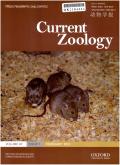Immune stress and diet influence reproductive fitness in male tuatara (Sphenodon punctatus)
IF 2
2区 生物学
Q2 ZOOLOGY
引用次数: 0
Abstract
The theoretical trade-off between immune and endocrine investment in mating animals has received mixed empirical support, particularly in reptiles. We investigated the relationship between male sexual characteristics, diet, and immune response to stress in an island population of tuatara (Sphenodon punctatus) across two mating seasons. Tuatara are promiscuous with a highly skewed mating system where males face significant competition for access to mates and post-copulatory competition for fertilisation success. We found that tuatara sperm viability and swim speed were negatively associated with the ratio of heterophils to lymphocytes and with male body condition. Additionally, sperm swim speed was negatively associated with spine area, mite load, and the total number of circulating white blood cells, but was positively associated with tick number, likely a function of social dynamics in this system where larger male size predicts greater spatial overlap with potential rivals and increased tick load. Because the production of sexual characteristics may be costly, we also investigated the effect of diet on sperm quality. We did not identify an association between diet and sperm viability. However, sperm swim speed was negatively associated with carbon-13 and positively associated with nitrogen-15. We suspect that these results reflect the influence of seabird-based nutrients in this island ecosystem, particularly poly-unsaturated fatty acids, and antioxidant damage on this tuatara sperm. In total, these results provide evidence of a trade-off between pre- and post-copulatory sexual characteristics and the immune and endocrine systems in male tuatara.免疫应激和饮食对雄性疣鼻天鹅(Sphenodon punctatus)生殖能力的影响
交配动物在免疫和内分泌投资之间的理论权衡得到了不同的经验支持,尤其是在爬行动物中。我们研究了一个岛屿上的疣鼻猴(Sphenodon punctatus)种群在两个交配季节中雄性性征、饮食和对压力的免疫反应之间的关系。疣鼻鱧是一种滥交动物,其交配系统高度倾斜,雄性在交配过程中面临着获得配偶的激烈竞争,以及交配后受精成功率的竞争。我们发现,图阿塔拉的精子存活率和游动速度与嗜异性细胞和淋巴细胞的比例以及雄性身体状况呈负相关。此外,精子游动速度与脊柱面积、螨虫数量和循环白细胞总数呈负相关,但与蜱虫数量呈正相关,这可能是该系统中社会动态的一种功能,即雄性体型越大,与潜在对手的空间重叠越多,蜱虫数量也越多。由于产生性征可能需要付出代价,我们还研究了饮食对精子质量的影响。我们没有发现饮食与精子存活率之间存在关联。但是,精子的游动速度与碳-13呈负相关,而与氮-15呈正相关。我们推测这些结果反映了这个岛屿生态系统中以海鸟为基础的营养物质(尤其是多不饱和脂肪酸)的影响,以及抗氧化剂对这种图塔拉精子的损害。总之,这些结果提供了雄性图阿塔拉在交配前后性征与免疫和内分泌系统之间进行权衡的证据。
本文章由计算机程序翻译,如有差异,请以英文原文为准。
求助全文
约1分钟内获得全文
求助全文
来源期刊

Current Zoology
Agricultural and Biological Sciences-Animal Science and Zoology
CiteScore
3.20
自引率
9.10%
发文量
111
审稿时长
6 weeks
期刊介绍:
About the Journal
Current Zoology (formerly Acta Zoologica Sinica, founded in 1935) is an open access, bimonthly, peer-reviewed international journal of zoology. It publishes review articles and research papers in the fields of ecology, evolution and behaviour.
Current Zoology is sponsored by Institute of Zoology, Chinese Academy of Sciences, along with the China Zoological Society.
 求助内容:
求助内容: 应助结果提醒方式:
应助结果提醒方式:


